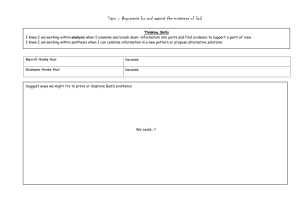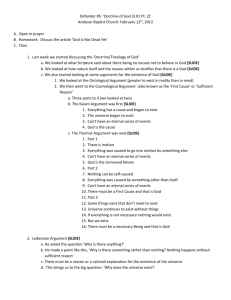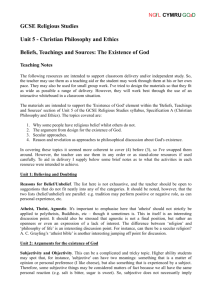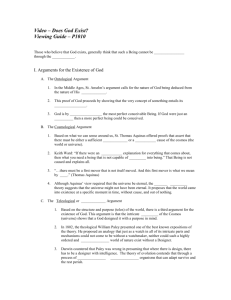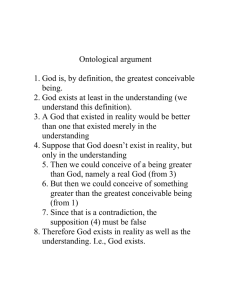"What is the transcendental argument for the existence
advertisement
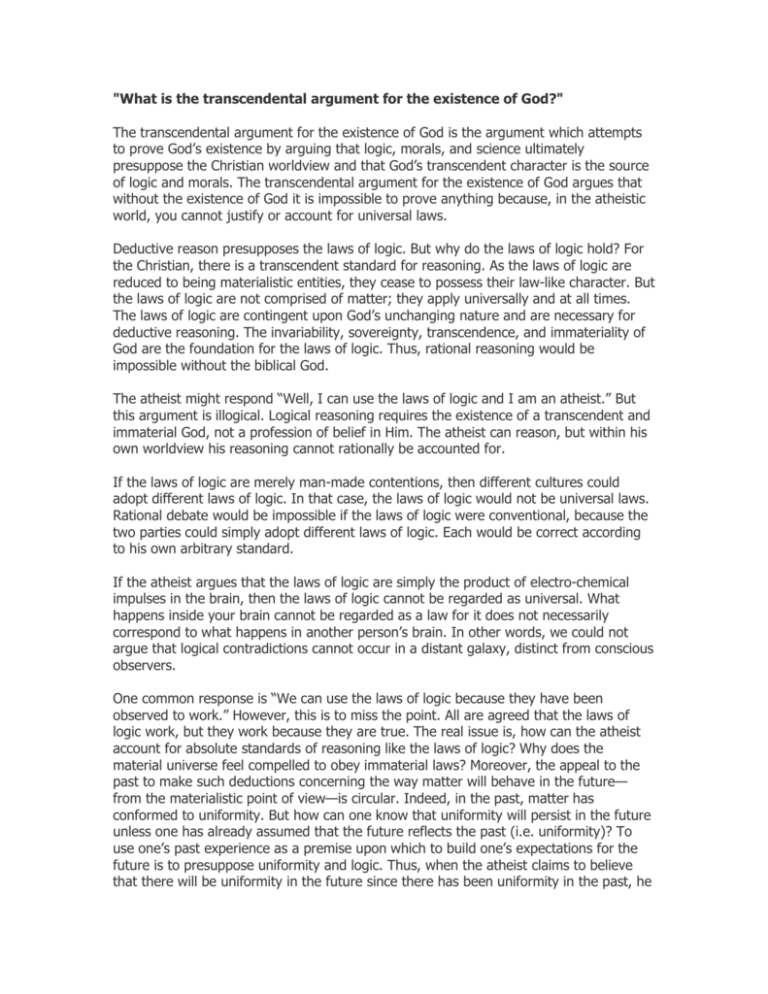
"What is the transcendental argument for the existence of God?" The transcendental argument for the existence of God is the argument which attempts to prove God’s existence by arguing that logic, morals, and science ultimately presuppose the Christian worldview and that God’s transcendent character is the source of logic and morals. The transcendental argument for the existence of God argues that without the existence of God it is impossible to prove anything because, in the atheistic world, you cannot justify or account for universal laws. Deductive reason presupposes the laws of logic. But why do the laws of logic hold? For the Christian, there is a transcendent standard for reasoning. As the laws of logic are reduced to being materialistic entities, they cease to possess their law-like character. But the laws of logic are not comprised of matter; they apply universally and at all times. The laws of logic are contingent upon God’s unchanging nature and are necessary for deductive reasoning. The invariability, sovereignty, transcendence, and immateriality of God are the foundation for the laws of logic. Thus, rational reasoning would be impossible without the biblical God. The atheist might respond “Well, I can use the laws of logic and I am an atheist.” But this argument is illogical. Logical reasoning requires the existence of a transcendent and immaterial God, not a profession of belief in Him. The atheist can reason, but within his own worldview his reasoning cannot rationally be accounted for. If the laws of logic are merely man-made contentions, then different cultures could adopt different laws of logic. In that case, the laws of logic would not be universal laws. Rational debate would be impossible if the laws of logic were conventional, because the two parties could simply adopt different laws of logic. Each would be correct according to his own arbitrary standard. If the atheist argues that the laws of logic are simply the product of electro-chemical impulses in the brain, then the laws of logic cannot be regarded as universal. What happens inside your brain cannot be regarded as a law for it does not necessarily correspond to what happens in another person’s brain. In other words, we could not argue that logical contradictions cannot occur in a distant galaxy, distinct from conscious observers. One common response is “We can use the laws of logic because they have been observed to work.” However, this is to miss the point. All are agreed that the laws of logic work, but they work because they are true. The real issue is, how can the atheist account for absolute standards of reasoning like the laws of logic? Why does the material universe feel compelled to obey immaterial laws? Moreover, the appeal to the past to make such deductions concerning the way matter will behave in the future— from the materialistic point of view—is circular. Indeed, in the past, matter has conformed to uniformity. But how can one know that uniformity will persist in the future unless one has already assumed that the future reflects the past (i.e. uniformity)? To use one’s past experience as a premise upon which to build one’s expectations for the future is to presuppose uniformity and logic. Thus, when the atheist claims to believe that there will be uniformity in the future since there has been uniformity in the past, he is trying to simply justify uniformity by presupposing uniformity, which is to argue in a circle. To conclude, the transcendental argument for the existence of God argues that atheism is self-refuting because the atheist must presuppose the opposite of what he is attempting to prove in order to prove anything. It argues that rationality and logic make sense only within a Christian theistic framework. Atheists have access to the laws of logic, but they have no foundation upon which to base their deductive reason within their own paradigm. My view on the transcendental argument for the existence of God Personally I don’t dwell on this argument, simply because I don’t see any profit in discovering the truth about the existence of god. I was raised as a catholic environment but as I grew up I discovered that having a religion is somewhat inconvenient you have traditions and rules to follow that I find unreasonable and irrational. While doing this paper I found an interesting article on the internet, although I do not totally understand it I see that it is somewhat similar to my belief about god and his existence. Just as people with religion want to share their belief I also want to do the same, I want to share my side about having or not having a religion and about god’s existence. So to better understand what I’m talking about I will share the article that I found,.. Some state that the transcendental argument is flawed. One such argument comes from Michael Martin at Infidels.org, a website which is blatantly anti-Christian. The following are excerpts from Mr. Martin's paper on that site titled, "The Transcendental Argument for the Nonexistence of God." Mr. Martin's paper is worth a read, but, in my opinion, is flawed. He said, "Consider logic. Logic presupposes that its principles are necessarily true. However, according to the brand of Christianity assumed by TAG [transcendental argument for God], God created everything, including logic; or at least everything, including logic, is dependent on God. But if something is created by or is dependent on God, it is not necessary -- it is contingent on God..." If God exists, then God has attributes such as thoughts, character, essence, nature, etc. His attributes would be perfect--since He would be, by default, perfect, the standard of perfection, the omniscient, omnipotent creator. His thoughts would necessarily be consistent within Himself: perfect. God is by nature non-self-contradictory since a selfcontradictory thing cannot exist. Logic, then, would not be a created thing, but an attribute of God's perfect existence as it relates to His thought processes. Since God exists eternally in all places, logic cannot have been created, but is, so to speak, eternal as well. In other words, the existence of logic, based upon God's existence, is indeed a necessary thing since it would be a "part" of God's own natural thought processes. It would then be something innate, natural, and ontologically necessary because God exists and is not contingent upon anything. Therefore, logic would not be a creation of God, but a necessary existence because God exists. "And if principles of logic are contingent on God, they are not logically necessary. Moreover, if principles of logic are contingent on God, God could change them. Thus, God could make the law of non-contradiction false; in other words, God could arrange matters so that a proposition and its negation were true at the same time. But this is absurd. How could God arrange matters so that New Zealand is south of China and that New Zealand is not south of it? So, one must conclude that logic is not dependent on God, and, insofar as the Christian world view assumes that logic is so dependent, it is false. As I stated above, logic is a necessary, uncreated, and a non-contingent necessity given God's absolute, perfect, and eternal existence. Logic would not be changeable because God is not changeable. This explains why logical truths are always true. They are absolute and transcendent by nature because God is absolute and transcendent by nature. Logic is non-self-contradictory, because God is non-self-contradictory. "Consider science. It presupposes the uniformity of nature: that natural law govern the world and that there are no violations of such laws. However, Christianity presupposes that there are miracles in which natural laws are violated. Since to make sense of science one must assume that there are no miracles, one must further assume that Christianity is false. To put this in a different way: Miracles by definition are violations of laws of nature that can only be explained by God's intervention. Yet science assumes that insofar as an event as an explanation at all, it has a scientific explanation -- one that does not presuppose God. Thus, doing, science assumes that the Christian world view is false." We do not know all the laws of the universe. God does, since He brought the universe into existence and created that which our descriptive laws quantify. What we would consider supernatural may simply be God's working of unknown natural laws on a level that only God understands. Mr. Martin's assertion does not necessitate a violation of natural laws; rather, a perceived violation of natural laws now known. "Consider morality. The type of Christian morality assumed by TAG [transcendental argument for God] is some version of the Divine Command Theory, the view that moral obligation is dependent on the will of God. But such a view is incompatible with objective morality. On the one hand, in this view what is moral is a function of the arbitrary will of God; for instance, if God wills that cruelty for its own sake is good, then it is. On the other hand, determining the will of God is impossible since there are different alleged sources of this will (The Bible, the Koran, The Book of Mormon, etc) and different interpretations of what these sources say; moreover; there is no rational way to reconcile these differences. Thus, the existence of an objective morality presupposes the falsehood of the Christian world view assumed by TAG." Mr. Martin uses the phrase "objective morality," a phrase that is worthy of a long discussion. Nevertheless, I see no reason to conclude that moral truth coming from God is incompatible with objective morality. Furthermore, God's will is not arbitrary. It is consistent with His own nature and purpose. In other words, the omniscient God eternally knows all things and works his knowledge in accordance with his immutable/absolute nature. Therefore, morality could not be arbitrary; that is, God doesn't arbitrarily say that lying is wrong. It is wrong because God cannot lie. Morality is not a set of made-up rules. Morality is based on God's absolute nature. Mr. Martin further fails to see the philosophical difference between Islam and Mormonism. In Islam, Allah is capricious. In Mormonism, God is changeable and not absolute. The God of Christianity is eternally immutable (absolute and unchangeable). There is a large difference between the Christian God and the ones of the others he mentioned. "There are, of course, ways to avoid the conclusions of TANG [Transcendental Argument for the Non-Existence of God]. One way is to reject logic, science and objective morality. Another is to maintain belief in God but argue that logic, science and morality are not dependent on God's existence. However, the first way is self-defeating since Christian apologists use logic to defend their position and the second way presumes that TAG is invalid since it assumes that logic, science, and morality do not assume God's existence. Finally, one can object to particular aspects of TANG, for example, the claim that there is no rational way to reconcile different interpretations of the Bible. However, this tack would involve a detailed defense of TAG -- something that has yet to be provided."
